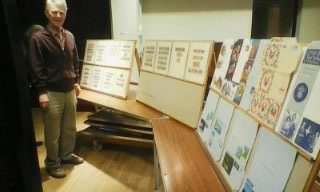The topic for the meeting was “The Letter C”.
The Chairman opened the meeting with the sad news of the death of the wife of member James Podger and said that a card would be sent on behalf of himself, the Committee and the Membership. He was delighted at the splendid attendance of 59.
First up was David Carr with a brief PowerPoint presentation on the GB 1d stamp, compiled with tongue firmly in cheek, as with the opening slide that began “A Complex Collection of Coupons…”. This was well-received.
The first conventional presentation was by Nigel Harris who showed Canadian Chalons, describing the origins of the “Chalon Head” and showing banknotes, stamps proofs, essays and forgeries.
David Hunter showed a selection of Papua New Guinea village cancels
Julia Todd showed part of her Fish collection, concentrating on Carp that has over 1500 sub-types.
Simon McArthur displayed “German Colonies and Germany’s attitude to them – how they got them and lost them after WWI. Hitler paid lip-service to a plan to recover them but was not really interested.
Peter White showed a fascinating collection of material from the “Scipio” flying-boat crash in Crete.
After the usual break for tea and to view the material, the second part was opened by John Dicker, who showed parts of his George VI collection from: Cayman Islands, Ceylon and Cyprus, including some shades from different printings and varieties.
Roger Vaughan showed Pictorial Air Letters, including Christmas and examples from the Channel Islands.
Derek Weston shared with us part of his extensive collection on Colman’s Mustard, including poster stamps, illustrated envelopes, overprinted postal stationery and attractive ephemera.
Michael Lockton showed part of his Postal History collection of Crediton in Devon, beginning with a letter from 1640 and going through to mid-Victorian times.
Michael Cope gave a brief overview of the “Chaos in the Congo” that ensued after independence from Belgium, when Katanga and South Kasai seceded and there were bloody internal conflicts. The Democratic Republic of Congo is still one of the most dangerous places in the world.
Last to show was Graham Mytton, who showed a small selection of Modern Postal History, addressing a wide range of topic, such as : Change of Regime in Romania and Iran, the split of Czechoslovakia; use of aerogramme labels, revenue stamps, trading stamps, used Machins, stamp selvedge and Postage Due stamps for postage.
The Chairman thanked all who had displayed, an apologised that he had not been able to accommodate all members that had brought something to show. In future he will limit displays to two frames unless there is spare space.
